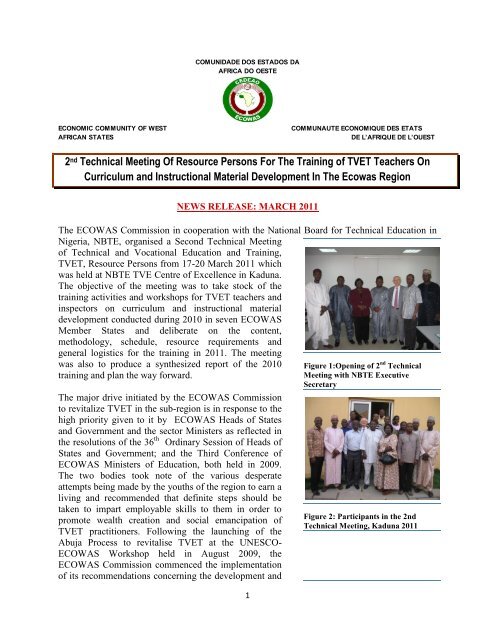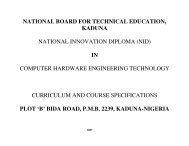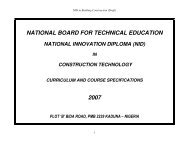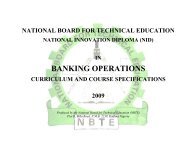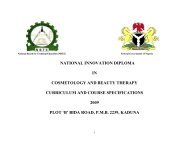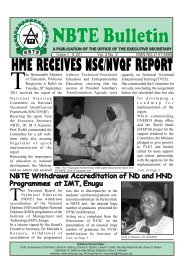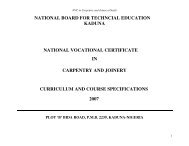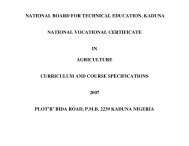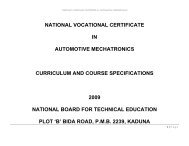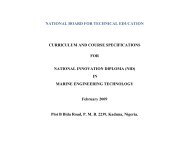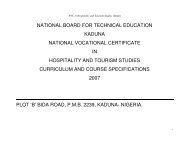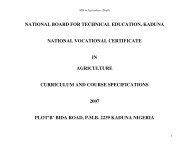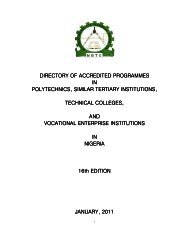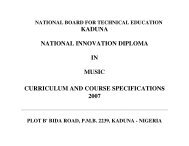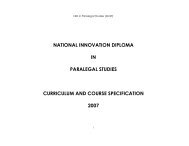2nd Technical Meeting Of Resource Persons For The ... - NBTE
2nd Technical Meeting Of Resource Persons For The ... - NBTE
2nd Technical Meeting Of Resource Persons For The ... - NBTE
You also want an ePaper? Increase the reach of your titles
YUMPU automatically turns print PDFs into web optimized ePapers that Google loves.
COMUNIDADE DOS ESTADOS DA<br />
AFRICA DO OESTE<br />
ECONOMIC COMMUNITY OF WEST<br />
AFRICAN STATES<br />
COMMUNAUTE ECONOMIQUE DES ETATS<br />
DE L’AFRIQUE DE L’OUEST<br />
2 nd <strong>Technical</strong> <strong>Meeting</strong> <strong>Of</strong> <strong>Resource</strong> <strong>Persons</strong> <strong>For</strong> <strong>The</strong> Training of TVET Teachers On<br />
Curriculum and Instructional Material Development In <strong>The</strong> Ecowas Region<br />
NEWS RELEASE: MARCH 2011<br />
<strong>The</strong> ECOWAS Commission in cooperation with the National Board for <strong>Technical</strong> Education in<br />
Nigeria, <strong>NBTE</strong>, organised a Second <strong>Technical</strong> <strong>Meeting</strong><br />
of <strong>Technical</strong> and Vocational Education and Training,<br />
TVET, <strong>Resource</strong> <strong>Persons</strong> from 17-20 March 2011 which<br />
was held at <strong>NBTE</strong> TVE Centre of Excellence in Kaduna.<br />
<strong>The</strong> objective of the meeting was to take stock of the<br />
training activities and workshops for TVET teachers and<br />
inspectors on curriculum and instructional material<br />
development conducted during 2010 in seven ECOWAS<br />
Member States and deliberate on the content,<br />
methodology, schedule, resource requirements and<br />
general logistics for the training in 2011. <strong>The</strong> meeting<br />
was also to produce a synthesized report of the 2010<br />
training and plan the way forward.<br />
<strong>The</strong> major drive initiated by the ECOWAS Commission<br />
to revitalize TVET in the sub-region is in response to the<br />
high priority given to it by ECOWAS Heads of States<br />
and Government and the sector Ministers as reflected in<br />
the resolutions of the 36 th Ordinary Session of Heads of<br />
States and Government; and the Third Conference of<br />
ECOWAS Ministers of Education, both held in 2009.<br />
<strong>The</strong> two bodies took note of the various desperate<br />
attempts being made by the youths of the region to earn a<br />
living and recommended that definite steps should be<br />
taken to impart employable skills to them in order to<br />
promote wealth creation and social emancipation of<br />
TVET practitioners. Following the launching of the<br />
Abuja Process to revitalise TVET at the UNESCO-<br />
ECOWAS Workshop held in August 2009, the<br />
ECOWAS Commission commenced the implementation<br />
of its recommendations concerning the development and<br />
1<br />
Figure 1:Opening of 2 nd <strong>Technical</strong><br />
<strong>Meeting</strong> with <strong>NBTE</strong> Executive<br />
Secretary<br />
Figure 2: Participants in the <strong>2nd</strong><br />
<strong>Technical</strong> <strong>Meeting</strong>, Kaduna 2011
updating of TVET curricula and learning materials;<br />
establishment of a network of regional TVET centers of<br />
excellence; development of National and Regional<br />
Qualifications Framework; and training of technical<br />
teacher. As recommended by the Ministers of<br />
Education for a speedy approach to revitalizing TVET<br />
the UNESCO format for curricula development which is<br />
the outcome of about ten years of consistent<br />
collaboration between UNESCO and Nigeria was to be<br />
adapted to the peculiar needs of other countries.<br />
As a first step the ECOWAS Commission Directorate<br />
for Education, Culture, Science and Technology<br />
organised a planning technical meeting at Kaduna from<br />
11-12 July 2010 which worked out details regarding the<br />
content, methodology, schedule, and resources<br />
requirements for the training workshops in all Member<br />
States. This was followed by an Induction Workshop for<br />
the International <strong>Resource</strong> <strong>Persons</strong>, IRPs who would in<br />
turn train TVET Teachers/Inspectors/Advisers on<br />
Curriculum and Instructional Material Development in<br />
the ECOWAS Region. <strong>The</strong> Induction Workshop was<br />
held in Lome, the Togolese Republic, from 9 th to 11 th<br />
August, 2010. During the period from September to<br />
December 2010 eight workshops were successfully<br />
organised by the ECOWAS Commission in Benin,<br />
Burkina Faso, Gambia, Ghana, Niger, Nigeria (North<br />
and South), and Senegal. Using the recommended<br />
UNESCO-ECOWAS format, 240 teachers/ inspectors/<br />
advisers selected from the seven countries benefited<br />
from the two-week training workshops in 2010.<br />
<strong>The</strong> training was hands-on with participants developing<br />
their own curriculum during the first week and the<br />
learning materials during the second week in their areas<br />
of expertise. Each participant also made presentations of<br />
the materials developed to the entire group, an<br />
arrangement which promoted motivation, team work,<br />
and high level determination among participants to<br />
develop materials of good quality.<br />
<strong>The</strong> opening ceremony of the 2 nd <strong>Technical</strong> <strong>Meeting</strong><br />
was attended by the Executive Secretary of <strong>NBTE</strong>, Dr.<br />
Masud A. Kazaure, the Director of Education, Culture,<br />
Science and Technology Prof. Abdoulaye Maga, six<br />
TVET international resource persons and professionals<br />
2<br />
Figure 3: Nigeria North Workshop,<br />
Kaduna, Sept 2010<br />
Figure 4: Nigeria South Workshop,<br />
Lagos Oct 2010<br />
Figure 5: Burkina Faso Workshop Oct<br />
2010<br />
Figure 6: Ghana Workshop, Tema,<br />
Nov 2010
from UNESCO <strong>NBTE</strong> Project and the ECOWAS<br />
Commission.<br />
<strong>The</strong> meeting reviewed the reports of the 8 workshops<br />
conducted during 2010 and assessed the outcomes and<br />
results achieved. In the light of the experience gained,<br />
the meeting also reviewed and updated the training<br />
instruments and modality to be employed in the next<br />
phase of the training programme. From the evaluation<br />
of the Workshops by the participants it was evident that<br />
all the workshops were timely and rated as big success.<br />
A consolidated report of the training was produced and<br />
a Plan of the Way <strong>For</strong>ward and schedule for the training<br />
workshops to be conducted during 2011 was also<br />
reviewed. <strong>The</strong> Plan envisage the replication of the<br />
training in ten more workshops to cover all remaining<br />
ECOWAS countries during 2011.<br />
In the countries covered in this phase different<br />
curriculum formats and methods were adopted in each<br />
country due to interventions from different<br />
Development Partners. <strong>The</strong> workshops participants<br />
therefore expressed delight that the uniform approach<br />
being proposed by ECOWAS will go a long way in<br />
revamping and harmonising the TVET sector<br />
Figure 7: Benin Workshop Dec 2010<br />
Figure 8: Senegal Workshop, Dec 2010<br />
At the closing session the participants commended the ECOWAS Commission and especially the<br />
Commission of Human Development and Gender for its vision of generating employment in<br />
ECOWAS Member States through the development of TVET in the region. <strong>The</strong> meeting further<br />
urged the Education Department to keep up the momentum of the training and capacity building.<br />
<strong>The</strong> Director of Education, Culture, Science and Technology thanked the participants for their<br />
assiduous hard work, in-depth knowledge of the subject matter and total commitment to the<br />
success of the UNESCO-ECOWAS TVET Revitalisation project in the ECOWAS region. He<br />
informed them that the Commissioner for Human Development and Gender was very pleased<br />
with the first phase of the TVET training workshop and he assured the meeting that their<br />
recommendations will be forwarded to the ECOWAS Authorities for further action.<br />
3


